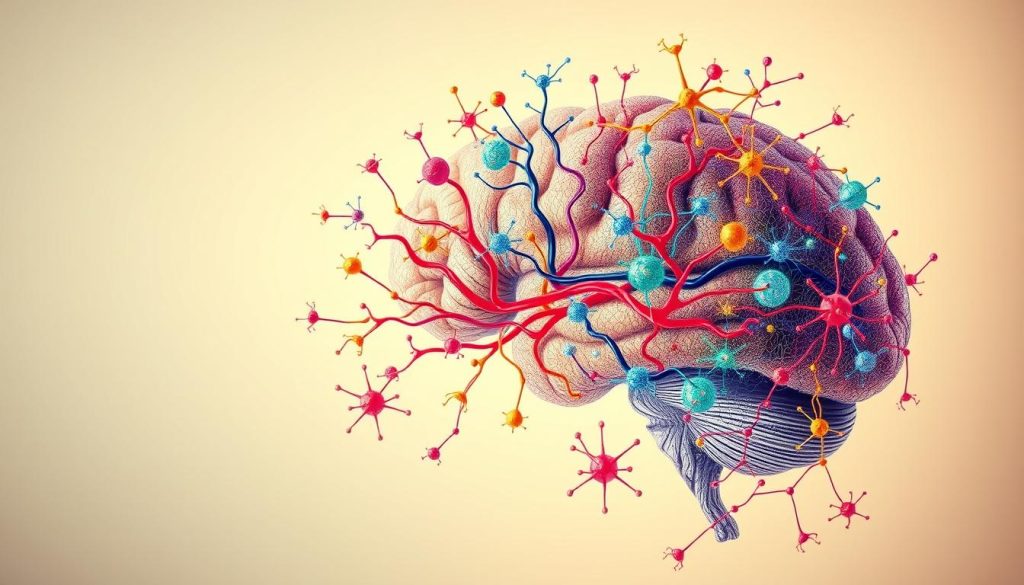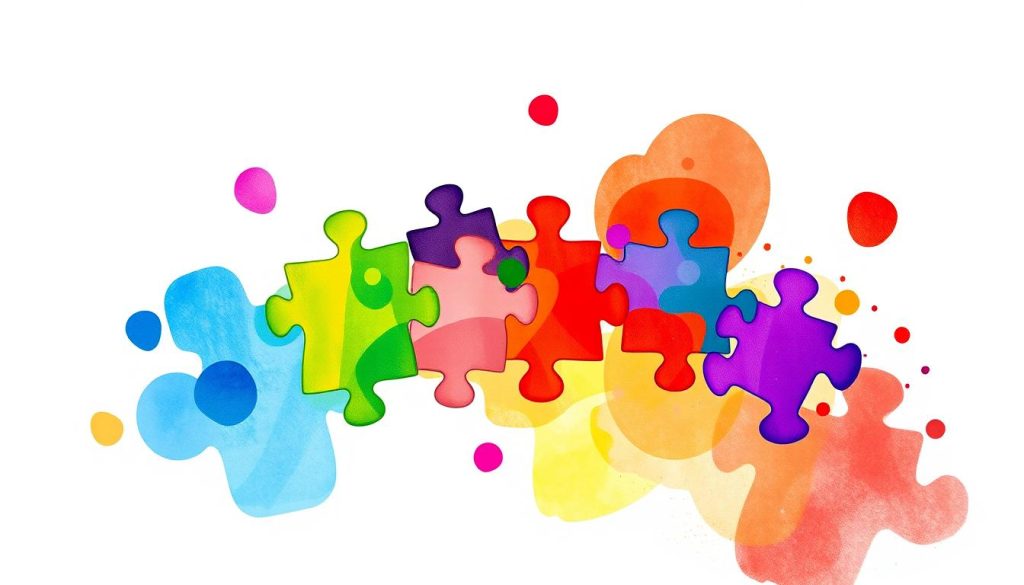Autism spectrum disorder (ASD) is a complex condition that affects how people interact and learn. Many wonder if autism is a mental disability. This question leads to a deeper discussion about ASD and its place in neurodevelopmental conditions.
To understand autism spectrum disorder, we need to look at its characteristics, causes, and daily impacts. We’ll explore the unique challenges and strengths of ASD. This will help us see why its classification is complex.
Let’s dive into the complexities of autism spectrum disorder. We’ll look at its connection to other neurodevelopmental conditions. This will help us better support individuals with ASD in our communities.
Understanding Autism Spectrum Disorder: A Comprehensive Overview
Autism spectrum disorder is a complex condition that affects people in different ways. This overview looks at the core traits, the spectrum aspect, and how our understanding of autism has changed.
Defining Autism and Its Core Characteristics
Autism spectrum disorder is known for two main traits: social communication challenges and repetitive behaviors. People with autism may find it hard to interact socially, communicate, and understand social cues. They often show repetitive patterns in their actions, interests, or speech.
The Spectrum Nature of Autism
The term “spectrum” shows the wide range of symptoms and severity in autism. Some people need a lot of support, while others can live on their own. This variety shows why personalized care and support are key for those with autism.
| Autism Severity Level | Social Communication | Repetitive Behaviors |
|---|---|---|
| Level 1 (Requiring Support) | Noticeable difficulties | Inflexibility causes some interference |
| Level 2 (Requiring Substantial Support) | Marked deficits | Frequent interference with functioning |
| Level 3 (Requiring Very Substantial Support) | Severe deficits | Markedly interferes with functioning |
Historical Evolution of Autism Understanding
Our understanding of autism has grown a lot from its first description in the 1940s. What was once seen as a rare condition is now known as a spectrum disorder affecting millions. This growth has led to better ways to diagnose, more awareness, and better support for those with autism spectrum disorder.
Is Autism A Mental Disability: Exploring the Classification
Many people are unsure if Autism Spectrum Disorder (ASD) is a mental disability. To clear up this confusion, we need to understand how experts classify autism.
Autism is seen as a neurodevelopmental condition. This means it impacts brain development and function early on. Unlike mental health issues, which can start at any age, neurodevelopmental conditions are present from birth.

Those with autism may struggle with social interactions, communication, and behavior. The severity of these challenges varies greatly, which is why it’s called a spectrum disorder. Some may also have intellectual disabilities, while others have average or above-average intelligence.
| Characteristic | Neurodevelopmental Conditions | Mental Health Disorders |
|---|---|---|
| Onset | Early childhood | Can develop at any age |
| Duration | Lifelong | May be temporary or long-term |
| Primary Impact | Brain development and function | Thoughts, emotions, behavior |
| Examples | Autism, ADHD | Depression, Anxiety |
It’s important to note that autism is not a mental illness. While those with autism may face mental health issues, these are distinct from their autism diagnosis. Seeing autism as a neurodevelopmental condition helps in giving the right support and understanding.
The Neurodevelopmental Nature of Autism
Autism is a complex condition that affects brain development and function. It’s important to understand it to help those on the autism spectrum early on.
Brain Development and Autism
Studies show autism impacts brain growth and how it connects. Kids with autism often have bigger brains in early years but grow slower. This affects how they process information and react to things.
Genetic Factors and Environmental Influences
Autism has a strong genetic link, with many genes involved. Environmental factors might also play a part, mixing with genetics. This mix shows why early help is key for managing autism.
Neurological Differences in Autism
People with autism have unique brain differences. These include changes in brain structure, function, and how it connects. These differences can impact social skills, how they sense things, and their behavior.
| Brain Area | Function | Differences in Autism |
|---|---|---|
| Amygdala | Emotion processing | Enlarged in early childhood |
| Prefrontal cortex | Executive function | Altered connectivity |
| Temporal lobe | Language processing | Reduced activation during social tasks |
Knowing these brain differences helps create better early help for autism. By focusing on specific brain areas, therapies can meet each person’s unique needs and strengths.
Distinguishing Between Mental Health and Developmental Conditions
It’s important to know the difference between mental health issues and developmental disorders. Autism spectrum disorder is a developmental condition, not a mental health problem. This understanding helps in giving the right support and treatments.
Developmental disorders, like autism, affect brain growth and function from a young age. They impact areas like communication, social skills, and behavior. Mental health conditions, on the other hand, can start at any time and affect mood, thinking, and behavior.

Intellectual disabilities often happen with autism but are different conditions. Some people with autism might have intellectual disabilities, but many have average or above-average intelligence. This shows how diverse autism can be and why each person needs their own support plan.
| Aspect | Developmental Conditions | Mental Health Conditions |
|---|---|---|
| Onset | Early childhood | Can occur at any age |
| Primary Impact | Brain development and function | Mood, thinking, behavior |
| Examples | Autism spectrum disorder, intellectual disabilities | Depression, anxiety disorders |
| Treatment Approach | Lifelong support and interventions | Therapy, medication, lifestyle changes |
Understanding these differences is key for correct diagnosis, treatment, and support. It helps families, teachers, and healthcare workers tailor their help to meet the unique needs of those with autism or intellectual disabilities.
Social Communication Challenges in Autism
Autism spectrum disorder often brings unique social communication challenges. These difficulties can vary widely among individuals. They affect their ability to connect with others and navigate social situations.
Verbal Communication Patterns
People with autism may struggle with verbal communication. Some might speak very little, while others may talk at length about their interests. Understanding idioms, sarcasm, or subtle language nuances can be tough for them.
Non-verbal Communication Skills
Non-verbal cues pose another hurdle. Reading facial expressions, maintaining eye contact, or using appropriate gestures can be challenging. This makes it hard to pick up on unspoken social signals that neurotypical individuals often take for granted.
Social Interaction Difficulties
Social interactions can be complex for those with autism spectrum disorder. They might find it hard to start or maintain conversations, share interests, or understand social rules. This can lead to feelings of isolation or misunderstanding in social settings.
| Communication Area | Common Challenges | Potential Strategies |
|---|---|---|
| Verbal | Literal interpretation, difficulty with idioms | Clear, direct language; visual aids |
| Non-verbal | Reading facial expressions, maintaining eye contact | Social skills training, practicing in safe environments |
| Social Interaction | Starting conversations, understanding social rules | Social stories, role-playing exercises |
Understanding these social communication challenges is key to supporting individuals with autism spectrum disorder. With patience and appropriate strategies, many can improve their social skills and form meaningful connections.
Sensory Processing and Autism
People with autism spectrum disorder often face sensory processing issues. These problems can change how they see and react to things around them.
Sensory differences in autism show up in many ways. Some might find certain sounds or lights too much. Others might look for intense sensory experiences.
| Sensory System | Hypersensitivity | Hyposensitivity |
|---|---|---|
| Auditory | Covering ears, avoiding loud places | Making loud noises, seeking noisy environments |
| Visual | Squinting, avoiding bright lights | Staring at lights, seeking visual stimulation |
| Tactile | Disliking certain textures, avoiding touch | Seeking deep pressure, craving physical contact |
Sensory issues can really affect daily life for those with autism. They might find it hard in places with too much going on, like busy stores or loud classrooms.
To help, we can use different strategies. We can make spaces that are easier on the senses. Or use tools like noise-canceling headphones. Fidget toys can also help with touch needs.
It’s key to understand and help with sensory processing problems. By doing so, we can make life better for those on the autism spectrum. We can make places more welcoming and comfortable for everyone.
Cognitive Abilities and Autism Spectrum Disorder
Autism spectrum disorder impacts thinking and learning in many ways. People with autism often have unique strengths and challenges. This variety challenges common misconceptions about intelligence in autism.
Intelligence Variations in Autism
Autism spectrum disorder doesn’t always mean intellectual disabilities. Many individuals with autism have average or above-average IQs. Some show exceptional skills in areas like math, music, or visual arts.
| Intelligence Level | Percentage in Autism Population |
|---|---|
| Above Average | 10% |
| Average | 50% |
| Below Average | 40% |
Learning Styles and Processing
People with autism process information differently. Many excel at visual learning, using pictures and diagrams. Others might struggle with abstract ideas but shine in concrete, step-by-step learning. Understanding these unique learning styles is key to effective education and support.
Special Abilities and Talents
Some individuals with autism spectrum disorder have extraordinary talents. These might include perfect pitch in music, exceptional memory, or advanced problem-solving skills. While not universal, these special abilities highlight the diverse cognitive landscape of autism.
Recognizing the wide range of cognitive abilities in autism spectrum disorder helps create more inclusive and effective support systems. It’s important to focus on individual strengths while addressing challenges. This fosters a more nuanced understanding of autism and intellectual capabilities.
Impact of Autism on Daily Living
Autism changes daily life for those on the spectrum. It affects social interactions, education, and work. People with autism find it hard to make friends or get along at work.
They often struggle to understand social cues and body language. This makes social interactions tough.

In school, students with autism need special help to do well. They might need more time on tests or a quiet place for breaks. Visual schedules help with moving from one task to another.
Without the right support, their grades can drop. This is even though they might be very smart in some subjects.
For autistic adults, finding a job is hard. Some do well in jobs that need attention to detail or technical skills. But, others find it hard to get through job interviews or understand work rules.
Having clear instructions or flexible hours can help them succeed and feel happy at work.
Autistic individuals might also find daily tasks like showering, cooking, or managing money hard. Some need a lot of help to live on their own, while others can manage with a little support. Occupational therapy and life skills training can help them learn these important skills.
With the right support and accommodations, many autistic people lead happy lives. It’s important to understand their unique needs and strengths. This helps them feel included and valued in all parts of their daily lives.
Early Intervention and Support Services
Early intervention is key for kids with autism to reach their best. Getting help early can greatly improve a child’s growth and future.
Assessment and Diagnosis
The first step is a detailed assessment. Trained experts check a child’s behavior, how they communicate, and their growth. This helps find out if a child has autism and what they need.
Treatment Options
After finding out, families can look into treatments. These might include:
- Applied Behavior Analysis (ABA)
- Speech and language therapy
- Occupational therapy
- Social skills training
- Sensory integration therapy
Every child is different, so treatments are made to fit their needs.
Educational Support Systems
Schools are a big help for kids with autism. They offer:
- Individualized Education Programs (IEPs)
- Special education classes
- In-class aides
- Assistive technology
These help make school a place where every child can learn and grow.
| Support Service | Benefits | Typical Age Range |
|---|---|---|
| Early Intervention Programs | Improved social and communication skills | 0-3 years |
| Special Education Services | Tailored learning experiences | 3-21 years |
| Vocational Training | Job skills development | 14+ years |
Accommodations and Workplace Integration
Creating inclusive work environments for people with autism is key. Many companies now see the value of neurodiversity at work. They’re adding accommodations and support services to help autistic employees do well.

- Quiet workspaces to reduce sensory overload
- Flexible schedules to manage energy levels
- Clear, written instructions for tasks
- Regular breaks for self-regulation
- Noise-cancelling headphones
Support services are important for fitting in at work. Job coaches help autistic people with social interactions and work rules. Mentorship programs match autistic workers with experienced colleagues, making them feel part of the team.
| Accommodation | Benefit |
|---|---|
| Sensory-friendly lighting | Reduces visual stress and improves focus |
| Structured routines | Enhances productivity and reduces anxiety |
| Communication aids | Facilitates clearer interactions with colleagues |
| Assistive technology | Improves task completion and organization |
By welcoming neurodiversity and providing needed accommodations, employers can use the special talents of autistic individuals. This not only helps the employees but also boosts the whole team’s creativity and problem-solving skills.
Legal Rights and Disability Classification
In the United States, people with autism spectrum disorder have certain legal rights. These rights help ensure fair treatment in education, employment, and healthcare. Understanding these rights is key to getting the support services needed.
Educational Rights
Students with autism are guaranteed a free, appropriate public education. Schools must create individualized education programs (IEPs) for each student. These plans outline specific goals and support services to help students succeed academically and socially.
Employment Protection
The Americans with Disabilities Act (ADA) protects workers with autism from job discrimination. Employers must offer reasonable accommodations to help employees do their jobs. This can include flexible schedules, noise-canceling headphones, or written instructions.
Healthcare Access
Many health insurance plans now cover autism-related treatments and therapies. The Affordable Care Act requires coverage for behavioral health services, which often benefit those with autism spectrum disorder. Some states have laws mandating insurance coverage for specific autism treatments.
| Area | Key Rights | Relevant Laws |
|---|---|---|
| Education | Individualized Education Programs | Individuals with Disabilities Education Act (IDEA) |
| Employment | Protection against discrimination, Reasonable accommodations | Americans with Disabilities Act (ADA) |
| Healthcare | Coverage for autism-related treatments | Affordable Care Act, State-specific mandates |
Knowing these legal rights empowers individuals with autism and their families to advocate for necessary support services. It’s important to stay informed about local and federal laws. This ensures full access to available resources and protections.
Building Inclusive Communities for Autistic Individuals

Creating welcoming spaces for people with neurodevelopmental conditions is key to a thriving society. By understanding and embracing the unique needs of autistic individuals, we can build communities that support everyone’s growth and development.
Education plays a vital role in fostering inclusivity. Schools and workplaces can implement programs to raise awareness about autism and its diverse manifestations. This knowledge helps peers and colleagues better understand and support those with social communication challenges.
Inclusive design in public spaces can make a big difference. Sensory-friendly areas in parks, libraries, and stores allow autistic individuals to participate more comfortably in community life. Simple changes like dimmed lighting or quiet zones can create a more accessible environment for all.
Community events that celebrate neurodiversity promote acceptance and understanding. Art shows, talent showcases, and inclusive sports leagues highlight the strengths and abilities of autistic individuals, breaking down stereotypes and fostering connections.
Support groups for families and individuals affected by autism provide valuable resources and a sense of belonging. These networks offer practical advice, emotional support, and opportunities for social interaction, helping to build a strong, inclusive community fabric.
By working together to create accepting and supportive environments, we can ensure that autistic individuals feel valued and empowered to contribute their unique perspectives and talents to our shared community life.
Support Systems and Resources for Families
Families on the autism journey need strong support. Early help and services are key for those with autism and their families. Let’s look at some great resources for families in the U.S.
Support groups are a big help for families with autism. They offer emotional support, practical tips, and a sense of community. Many local groups meet regularly for parents to share and learn.
Learning about autism is important for families. Libraries, online classes, and workshops provide deep insights. They help families make better choices for care and education.
| Resource Type | Benefits | Examples |
|---|---|---|
| Support Groups | Emotional support, shared experiences | Autism Society of America chapters |
| Educational Resources | Increased understanding, informed decision-making | Autism Speaks online learning tools |
| Early Intervention Services | Improved outcomes, skill development | State-funded early intervention programs |
| Financial Assistance | Help with therapy costs, equipment | Medicaid waivers, grants |
Early intervention is vital for young children with autism. It helps with communication, social, and thinking skills. Many states offer free services for kids under three.
Financial help is also important for families. Medicaid waivers, grants, and insurance for autism therapies can ease the financial load. This support is key for families seeking services.
Moving Forward: Acceptance and Understanding
The world is changing, becoming more welcoming to autism spectrum disorder. We now see it as a special way of seeing the world, not a weakness. This shift helps autistic people thrive and feel respected.
Accepting neurodiversity means seeing the strengths in neurodevelopmental conditions. Autistic people often excel in problem-solving, recognizing patterns, or creative thinking. By valuing these skills, we enrich our community.
Education is key to acceptance. Learning about autism helps us support it better. We can make environments more comfortable, communicate clearly, and respect different ways of interacting. With the right support, autistic individuals can achieve their goals and make a big impact.
Let’s work towards a world where autism is understood and valued. By supporting acceptance and providing help, we can make a brighter future for all on the autism spectrum. Together, we can create a society that celebrates all kinds of minds.
FAQ
Q: Is autism considered a mental disability?
A: No, autism is not seen as a mental disability. It’s a neurodevelopmental condition that affects brain development. It’s different from mental health disorders and is a unique way of processing information and interacting with the world.
Q: What are the main characteristics of autism spectrum disorder?
A: Autism spectrum disorder includes challenges in social communication, repetitive behaviors, and sensory processing issues. These traits vary in intensity and presentation among individuals, making autism a spectrum condition.
Q: Can individuals with autism have normal or high intelligence?
A: Yes, people with autism can have normal, high, or exceptional intelligence. Autism is not linked to intellectual disabilities. Many autistic individuals have average or above-average IQs and show exceptional abilities in areas like mathematics, music, or art.
Q: How important is early intervention for autism?
A: Early intervention is key for individuals with autism. It can greatly improve language development, social skills, and adaptive behaviors. Early diagnosis and support help children with autism develop essential skills for daily life.
Q: What types of support services are available for individuals with autism?
A: There are many support services for individuals with autism. These include behavioral therapies, speech and language therapy, occupational therapy, educational support, and social skills training. There are also support groups, vocational training programs, and advocacy services for autistic individuals and their families.
Q: How does autism affect social communication?
A: Autism can affect social communication in many ways. This includes difficulties with non-verbal cues, maintaining conversations, literal language interpretation, and social reciprocity. The extent and nature of these challenges vary among individuals on the autism spectrum.
Q: Are there specific workplace accommodations for individuals with autism?
A: Yes, there are many workplace accommodations for individuals with autism. These might include clear instructions, a quiet workspace, flexible work hours, noise-cancelling headphones, or a workplace mentor. The specific accommodations depend on the individual’s needs and the job.
Q: How does sensory processing differ in individuals with autism?
A: Many individuals with autism have sensory processing issues. This can mean being over-sensitive or under-sensitive to sensory stimuli. They might be overwhelmed by loud noises, bright lights, or certain textures, or seek intense sensory experiences. These differences can significantly impact daily life and behavior.
Q: What legal rights do individuals with autism have?
A: Individuals with autism have legal rights, including the right to appropriate education, protection against discrimination in employment, and access to healthcare services. In many countries, autism is recognized as a disability under law, providing protections and accommodations in education, employment, and public settings.
Q: How can communities become more inclusive for individuals with autism?
A: Communities can become more inclusive by increasing awareness and understanding of autism. This includes providing sensory-friendly spaces and events, supporting families, and promoting acceptance of neurodiversity. Education programs, inclusive hiring practices, and accommodating environments are key to creating a more inclusive community.


















